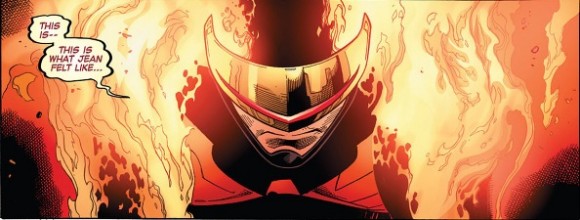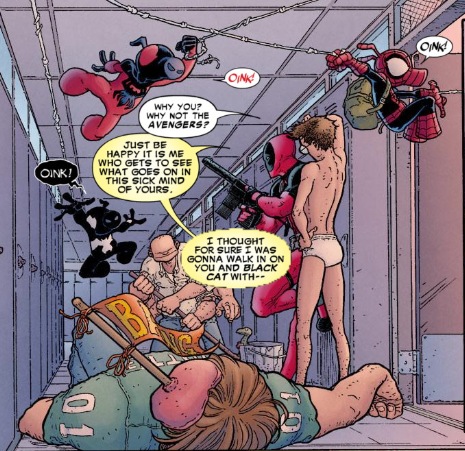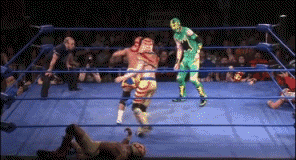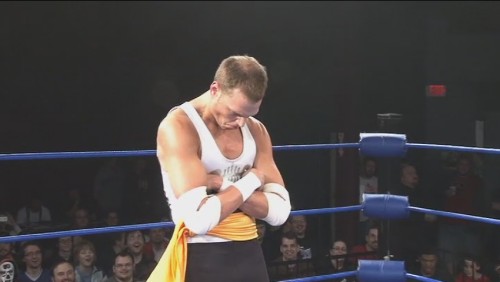
Grant Morrison & The Fan Entitlement That Wasn’t
September 18th, 2012 Posted by david brothers | Tags: grant morrisonComing to the end of a five-year run on various titles starring the caped crusader, the Batman brand has cemented Morrison’s reputation as one of the top writers in his field. That fame though has come with the price of becoming a figurehead for the industry, a responsibility that he is happy to escape when he steps away from superheroes next year. Morrison stresses again and again that he sees himself as a “freelance writer” rather than a cog in the corporate publishing machine, yet his words are pounced upon, dissected and recycled by fans and critics alike.
“They try to find some hidden darkness or something like that,” he sighs, “or ‘this proves, this proves!’ – naw, it just proves I said something that day, you know, which either I still agree with or don’t. Why do I have to defend all of this? I think people just want to be mad and want to fight all the time, so I’m gonna join in now!”
—New Statesman – Grant Morrison: Why I’m stepping away from superheroes
From my position as someone who has gone from stannish to uncomfortable to frustrated and on down to fed up with Morrison’s public persona, this is an utterly gross interview on both sides. The interviewer, Laura Sneddon, is clearly a fan of Morrison, which is fine. I interview people I’m a fan of, too, and I don’t hammer them on things. Not every interview has to be hard-hitting, obviously, but there’s a difference between a friendly, fun interview and one that puts the subject over at the expense of everyone else.
Sneddon, when asking about contentious points, minimizes and turns complaints against Morrison into easily-dismissed strawmen. She mentions that it seemed “like many of the detractors were coming from a distinctly middle class perspective” and Morrison agrees with her and goes on about middle class prejudices against the “trappings of high privilege.” (what?) Earlier in the interview, she writes: “Is it a slightly classist thing, I wonder, the idea that you can just drop your job at work as a protest?” (what?) She asks Morrison about comics critic Matt Seneca grilling and eating (part of) a copy of Morrison’s Supergods. Instead of Seneca’s weird performance being an act with some type of point, it’s used as evidence that “Fans are crazy and cynical and stupid.” Dissent is never treated as reasonable, only as aberration, and a de-fanged aberration at that.
This approach is tainted to me, because it’s a journalist once again taking (sometimes) reasonable dissent and painting it as babytown frolics, instead of something people actually care about. The Seneca point is an extreme example, of course, but that feeling permeates the piece. “These guys are dumdums, aren’t they?” instead of “So what’s up with this?” It feels like whenever fans or critics are mentioned, it’s about how they’re hurting comics or doing terrible things to a nice old comics writer.
The most aggravating part of the interview is the quote at the top of the post. That is a grown man asking why people believe the things that come out of his mouth. He wants to know why, after he says things, people care about them and hold him to his word. “Why can’t I just say things willy-nilly without having people look at my position?” he’s essentially asking here.
That is laughable, because he has built a career, in part, on people paying attention to, falling in love with, and believing his words. He set himself up as a counter-culture type of guy by producing works that embraced the counter-culture and drew on classic counter-culture subject matter and authors. He’s given at least one rock starred out speech at DisInfocon, and his letters pages let interact with a specific subset of comics readers.
He built this personality, this image of Grant Morrison-as-King Mob. That didn’t come from the fans or critics cruelly picking apart his words. No, we took him at his word and at his work, just like we’ve done with everyone from Stan Lee to Frank Miller to Dave Sim to Alan Moore. When confronted with the fact that King Mob prefers to defend a corporation over creators, describes a certain subset of fans as “voluminous Goth girls, victims of some unspeakable abuse,” and generally isn’t who he sold himself to be, I (and others, sure, but this is all about me-me-me-me-me) reacted with surprise, and then frustration.
It’s my fault, of course. I believed the hype. I believed in what Grant Morrison said and wrote, so I just set myself up for disappointment. Judging by this interview, what I should have done, were I not a weary cynic ready to burn down the temple (“the temple!”), was to assume that Morrison was just a cog in the machine and not take him so seriously, I guess.
But the thing is, I’m not a weary cynic. I’m a fan. I’m a fan who followed Morrison’s writings in comics and elsewhere, looking for and generally receiving knowledge jewels or great laughs. I’m not a cynic or critic that’s just aching to throw a sacred cow on the rack. I’m disappointed that the persona this guy sold me was a smokescreen, and that the real guy is someone I disagree with on a lot of different things. I feel played, if anything.
Later in the interview, Morrison says that he “still feel[s] the same way I do about the monarchy, the class system, about everything I’ve ever written, about everything I will write.”
Word?
We don’t believe you. You need more people.



































